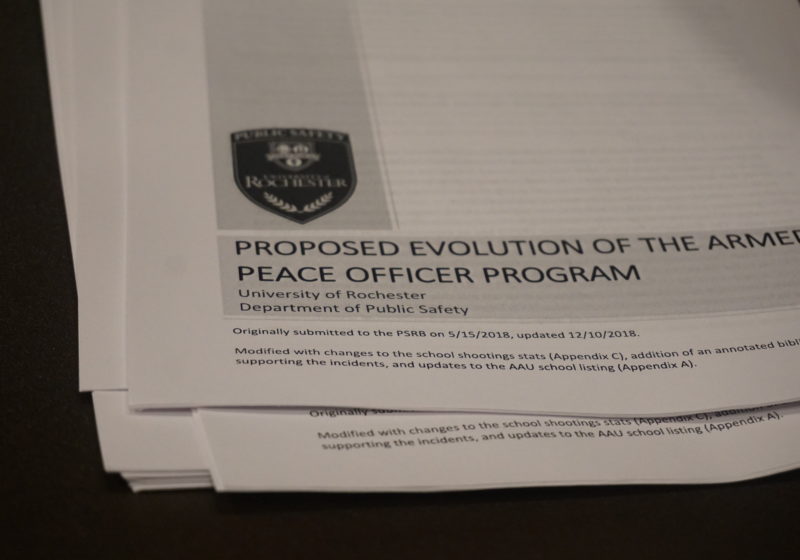It took six months, a sit-in demonstration, a public forum, and a new 27-person committee, but President Feldman’s decision on Public Safety’s gun proposal has arrived.
There will be no armed officer posts created at the River Campus and Eastman, Feldman said in his community-wide email. However, Feldman has granted armed supervisors access to all campuses, effective immediately.
“The passage of time and changing circumstances may necessitate a reexamination of this issue, but I believe that the current decisions are appropriate for the current situation,” Feldman said.
The proposal had outlined three new armed DPS posts — two on vehicle patrol at the River Campus and one on foot patrol at Eastman. Feldman cited reasons for and against this aspect of the proposal, including weighing the risk of an active shooter incident against fears of officers misusing weapons expressed by minority community members.
Ultimately, DPS armed patrols will still be restricted to the Medical Center. “I believe that it would be a mistake to make a change […] in the face of the concerns and fears that have been expressed and in the absence of a consensus in support,” Feldman said.
Before Feldman’s decision, armed supervisors were allowed on campus only in life-threatening emergency situations. He said that the new access “will allow supervisor to provide oversight more effectively” and enable “efforts to build trust among officers and […] the campus community.”
The decision came almost a week after the Public Safety Review Board had voted on its recommendation to Feldman regarding the proposal. They recommended approving both the new armed posts and the supervisor access.
Instead, Feldman’s decision to adopt one part of the proposal and reject another is consistent with the majority’s recommendation from the ad hoc Public Safety Proposal Advisory Committee.
The Advisory Committee — a group of faculty, students, staff, and a community member — formed in response to widespread concerns about the proposal, submitted its report to Feldman and the Review Board in March.
The report attempts to elaborate on armed supervisors’ new access.
“As we understand this, the access is ‘unrestricted’ in terms of the areas of campus that may be visited […], but it is not unqualified, since the purposes for which that unrestricted access is granted are distinctly limited,” the Advisory Committee wrote.
SA Senator Justyna Gorka, a sophomore, agreed with not adding armed officers but was “a bit more wary” about Feldman’s lack of detail regarding the nature of this access.
“When and how will armed [the access] be warranted?” she asked. “What checks and balances will be put into play?”
Director of Public Safety Mark Fischer gave no statement on today’s outcome but said he appreciates “all of the time and consideration given to this proposal by many individuals.”
Senior Vice President and Review Board member Holly Crawford said she will be working with Fischer on “preliminary and long term recommendations; some of which have already been in the works.”
Feldman’s email also mentioned that “recommendations made by both the committee and the PSRB provide all of us with a way forward to greater trust and cooperation.”
Some recommendations by the Review Board are open DPS training sessions, inviting DPS officers to club meetings and other campus events, adding DPS student “officers” who would assist with safety, and creating a direct way to submit complaints about DPS to the Review Board.
The Advisory Committee’s recommendations include increased education about both DPS and the surrounding community at orientation, making clearer the Review Board’s policies on when an armed response is appropriate, and making any future arming processes more public and democratic from the start.
Eastman professor Reinhild Steingrover, a member of the Advisory Committee, urged people to read the report.Both co-chairs of the Advisory Committee — professor William FitzPatrick and junior Jamal Holtz, SA president — expressed satisfaction with Feldman’s decision.
“In particular, the decision ultimately to reject the introduction of newly armed patrols on our campuses and on properties west of the river was a wise one,” FitzPatrick said.
Holtz cited the Advisory Committee’s report, which says over 60 percent of students opposed the proposal, and said that he was glad no new officers were being armed on campus.
“This isn’t the end to ensuring that we’re holding folks accountable,” Holtz said. “And that accountability should be our focus moving forward.”




